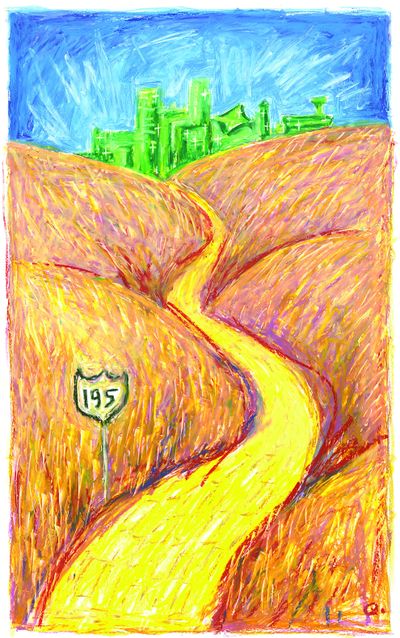A tale of two Spokanes
All roads seemingly lead through the Lilac City, and visitors either love it or hate it

Some see it as a modest yet inviting Mecca of culture and commerce. Others tend to think of it as a crime ridden, traffic-snarled pain in the back 40.
But to paraphrase a line from “Casablanca,” everybody comes to Spokane.
Well, almost.
“We loathe going to Spokane and go only if it is absolutely necessary,” said Bruce Werner, who described himself as semi-retired on a 26-acre hobby ranch in Idaho’s Bonner County. “Then it is get in, get it over with, and get out.”
His ability to resist the Lilac City’s charms stems from several factors. “Traffic, nutter/rude drivers, street layout downtown, and too many people.”
Plus, he said there’s not much he cannot take care of without crossing the state line.
That’s one end of the spectrum. Claudine Angstrom, who lives in Creston and works in Davenport, is on the other.
“I actually look forward to going to Spokane,” she said. “It’s great shopping, dining and just great entertainment. I, for one, have never been treated rudely by sales people or drivers or anyone as far as that goes. I love the people and all the busyness.”
So, different strokes. As you might expect. Does it even matter?
It could be argued that it does. Rural residents are important to Spokane’s economy. They spend a lot of money in the city. Their presence in our midst adds flavor to life in Spokane in countless ways.
Moreover, their attitudes about the urban hub of our region undoubtedly go a long way toward shaping the Inland Northwest’s overall self-image. And that colors how we present ourselves to the world.
This isn’t a simple country mouse vs. city mouse scenario. Many of those dwelling out in farm country or in small towns have been all around the globe. Some have lived in cities far larger than Spokane. They didn’t just fall off the lentil truck.
A few, such as produce-grower Dave Swett, have even lived in Spokane and have nothing against it. “But there is a reason we live out in the country,” he said from his home a couple of miles from Deer Park.
Sooner or later, though, many rural residents need to go to town. Maybe it’s to buy a dress or to see the Eagles.
For Republic’s Tom and Melissa Rose, appointments with medical specialists are one of the reasons they drive down to Spokane.
They have good things to say about many of the individuals they have encountered. They are less impressed with the city’s infrastructure, referring to Spokane’s roads as being pocked with “incision-ripping bumps and potholes.”
There are other beefs.
It bugs Bonners Ferry’s Carol Rutherford to come all the way to Spokane and then have to deal with what she regards as inefficient traffic flow. “It seems that for every corner you turn and every block you go, the light turns red in front of you.”
Sometimes, though, even people in the same family do not agree about Spokane’s appeal.
Ferry County resident Hayley Tolton works for a land survey office and her husband is an underground miner and a fifth generation farmer. They are in their 20s.
“I love visiting Spokane, it’s a wonderful city,” she said. “I like dining, concerts, shopping, et cetera. It’s a nice break from rural life. My husband, on the other hand, hates visiting Spokane and is usually pretty grouchy when he does have to make the trip. Almost all the women I know from here love Spokane. The men, well, it’s about 50/50.”
These differences in opinion probably do not come as a shock. Think about it. Even people who live in Spokane do not agree about whether it is perfect or perfectly dismal.
From the viewpoint of country cousins visiting the Inland Northwest’s largest city, there are multiple versions. There’s shopping mall Spokane. There’s lawyer’s office Spokane. There’s operating room Spokane.
Of course, in 2015, a person is not defined by his or her ZIP Code. Roy Dube, who farms near Rosalia, cherishes his agrarian lifestyle. But he also enjoys going to plays and trying new restaurants.
On the other hand, Air Force retiree Gary Polser lives less than half an hour west of Spokane but is not drawn to the city. “I live outside of town because I do not like being around large groups of people,” he said. “I also think diversity is way overblown. I go to Spokane only when I have to and never go out to eat. I only enjoy being around people who think like me.”
For some, perceptions of the crime danger in Spokane are part of the picture. Chewelah’s Marilyn Othmer admitted it crosses her mind. But it does not keep her from, say, attending the symphony.
You probably can’t tell, just from a glance, whether a rural resident visiting Spokane looked forward to coming to town or regarded the trip as a grim necessity.
But if you see Jerry and Dee Hargitt in Spokane, the Pend Oreille County couple just might be smiling. They like coming to town. “Even the traffic doesn’t bother us,” they said in an email.
Of course, it wouldn’t. They used to live in Seattle.